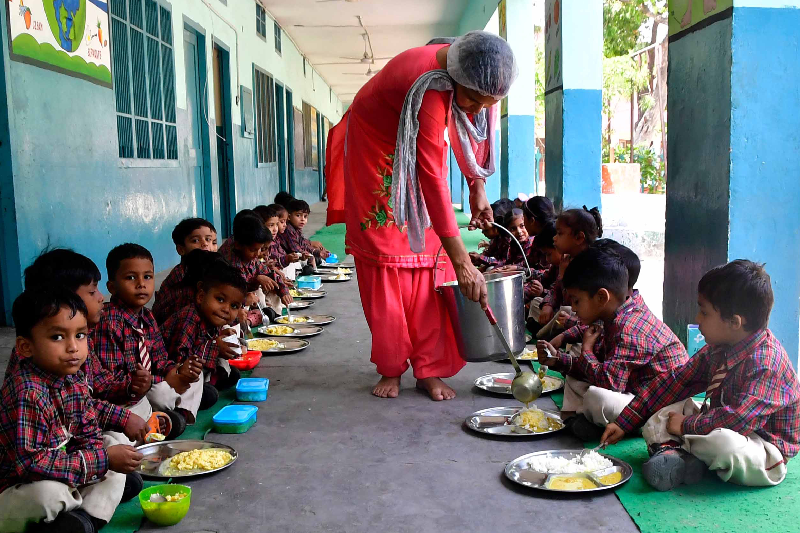
CBSE Rolls Out ‘Oil Boards’ in Schools After Sugar Boards: A Strategic Push Against Childhood Obesity
In a continued effort to curb lifestyle-related health issues among schoolchildren, the Central Board of Secondary Education (CBSE) has now introduced ‘Oil Boards’ across affiliated schools. This latest initiative follows the earlier rollout of ‘Sugar Boards’, aiming to create a healthier school environment and foster long-term behavioural change in dietary habits among students and staff.
The directive, issued in mid-July 2025, emphasizes visual health messaging in school premises to raise awareness about the harmful effects of consuming excessive fats and oils. These visual reminders, as CBSE believes, are crucial tools in influencing daily decisions and promoting a healthier lifestyle, particularly among children and adolescents.
What Are Oil Boards?
According to CBSE’s circular, Oil Boards are educational posters or digital displays installed in common areas of schools, such as cafeterias, hallways, lobbies, staff rooms, and meeting halls. These displays are designed to inform and remind students, teachers, and visitors about the risks associated with the excessive consumption of unhealthy fats and oils. They serve as silent educators, creating an environment where visual reinforcement helps build healthier food choices over time.
This initiative is intended not just to warn but also to educate. It advocates for the use of scientific information to present the harmful effects of saturated and trans fats, commonly found in fast foods, processed snacks, and fried items. The idea is to replace passive consumption with conscious decision-making.
The Health Context Behind the Initiative
The introduction of Oil Boards comes as India grapples with a growing obesity crisis. The CBSE circular references data from the National Family Health Survey (NFHS-5, 2019–21), which reveals that over 20% of adults in urban areas are either overweight or obese. Even more concerning, these trends are now being reflected in the school-going population.
Adding urgency to the situation, a Lancet study published in 2025 estimates that the number of overweight and obese adults in India will surge from 18 crore in 2021 to nearly 45 crore by 2050. This projection positions India as the country with the second-highest obesity burden globally, surpassed only by the United States.
Poor dietary habits, such as the overuse of oil in daily meals and the growing popularity of processed snacks, are leading contributors to this trend. Combined with reduced physical activity and increasing screen time, these habits are fueling a public health challenge that begins early in life.
CBSE’s latest move is part of a broader preventive health strategy that seeks to instill positive lifestyle choices at the school level—long before chronic diseases begin to manifest.
What Schools Are Required to Do
To bring the Oil Board campaign to life, CBSE has issued a set of specific guidelines for schools to follow. These include:
- Install Visual Displays: Schools are advised to use printed or digital Oil Boards in high-traffic areas. These should clearly highlight the risks of unhealthy oil consumption and encourage better choices like cooking with minimal oil or switching to heart-healthy oils such as olive, rice bran, or sunflower oil.
- Use Health Messaging on Stationery: In a subtle yet continuous reinforcement of the message, CBSE has asked schools to incorporate health-conscious reminders into official stationery. This includes letterheads, notebooks, folders, and circulars used by students and staff.
- Encourage Healthy Cafeteria Options: Schools must work towards revamping their cafeteria offerings. This means prioritizing low-fat, high-nutrition meals and restricting access to fried snacks and sugary beverages. Options such as fresh fruits, vegetable salads, and whole grains are encouraged.
- Promote Physical Activity: Recognizing the importance of movement, CBSE suggests integrating activity breaks between classes, promoting stair usage over elevators, and even creating walk-friendly pathways on campus to promote routine exercise.
- Integrate Students into the Initiative: A standout feature of the Oil Board directive is its emphasis on active student involvement. Schools are encouraged to treat the creation of Oil Boards as a classroom project. Students may research dietary fats, understand their impact on health, and design creative posters, infographics, or digital presentations to be featured within the school.
This participative approach is expected to deepen student understanding of health concepts and make the campaign more engaging and effective.
Collaboration with FSSAI
To further support this initiative, CBSE has directed schools toward supplementary resources provided by the Food Safety and Standards Authority of India (FSSAI). FSSAI’s official YouTube channel and social media platforms now feature educational content, including posters, short videos, and infographics related to the dangers of excessive oil and sugar consumption.
These materials are professionally designed and scientifically backed, providing schools with credible content to be used on their Oil Boards or during school assemblies and awareness drives.
The Bigger Picture: Behavioural Change Through Education
This initiative marks another milestone in CBSE’s push towards holistic student development. While academics remain a central focus, the Board is increasingly recognising the need to develop healthier lifestyles and lifelong wellness habits among students.
The Oil Board directive is not an isolated campaign but part of a comprehensive strategy that includes:
- Mental health awareness drives,
- Yoga and mindfulness integration,
- Nutrition education, and
- Preventive health screenings.
In adopting a multi-pronged approach to student wellbeing, CBSE hopes to build a school ecosystem that doesn't just impart knowledge but also shapes resilient, health-conscious citizens of the future.
Conclusion
As childhood obesity rates climb and poor dietary habits threaten to undo decades of public health progress, CBSE’s Oil Board initiative signals a timely and thoughtful response. By turning school spaces into daily reminders of healthy living and engaging students in the process, the Board aims to embed wellness into the very fabric of school life.



